Zhijie Sang
InfiMed-Foundation: Pioneering Advanced Multimodal Medical Models with Compute-Efficient Pre-Training and Multi-Stage Fine-Tuning
Sep 26, 2025



Abstract:Multimodal large language models (MLLMs) have shown remarkable potential in various domains, yet their application in the medical field is hindered by several challenges. General-purpose MLLMs often lack the specialized knowledge required for medical tasks, leading to uncertain or hallucinatory responses. Knowledge distillation from advanced models struggles to capture domain-specific expertise in radiology and pharmacology. Additionally, the computational cost of continual pretraining with large-scale medical data poses significant efficiency challenges. To address these issues, we propose InfiMed-Foundation-1.7B and InfiMed-Foundation-4B, two medical-specific MLLMs designed to deliver state-of-the-art performance in medical applications. We combined high-quality general-purpose and medical multimodal data and proposed a novel five-dimensional quality assessment framework to curate high-quality multimodal medical datasets. We employ low-to-high image resolution and multimodal sequence packing to enhance training efficiency, enabling the integration of extensive medical data. Furthermore, a three-stage supervised fine-tuning process ensures effective knowledge extraction for complex medical tasks. Evaluated on the MedEvalKit framework, InfiMed-Foundation-1.7B outperforms Qwen2.5VL-3B, while InfiMed-Foundation-4B surpasses HuatuoGPT-V-7B and MedGemma-27B-IT, demonstrating superior performance in medical visual question answering and diagnostic tasks. By addressing key challenges in data quality, training efficiency, and domain-specific knowledge extraction, our work paves the way for more reliable and effective AI-driven solutions in healthcare. InfiMed-Foundation-4B model is available at \href{https://huggingface.co/InfiX-ai/InfiMed-Foundation-4B}{InfiMed-Foundation-4B}.
InfiAlign: A Scalable and Sample-Efficient Framework for Aligning LLMs to Enhance Reasoning Capabilities
Aug 07, 2025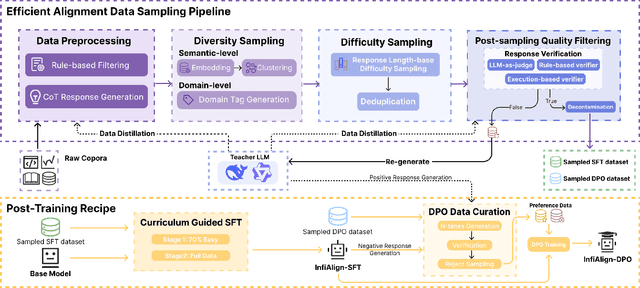

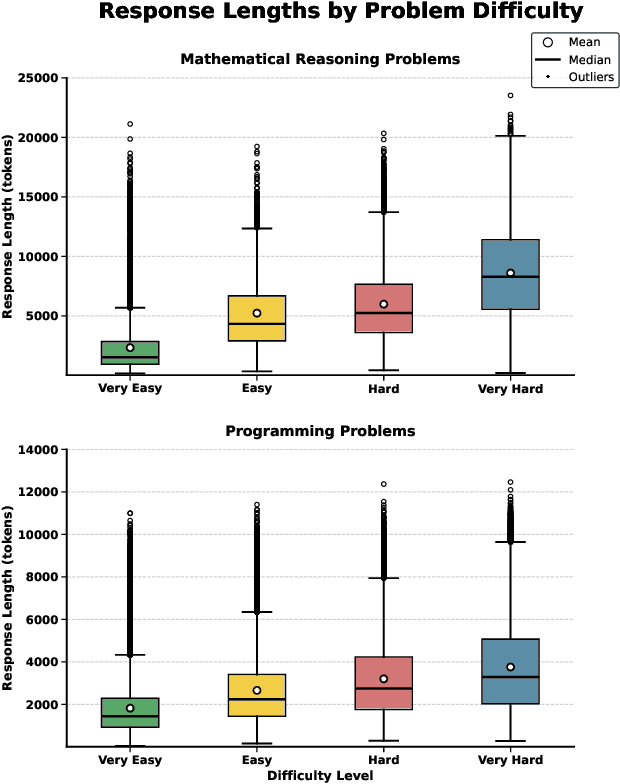

Abstract:Large language models (LLMs) have exhibited impressive reasoning abilities on a wide range of complex tasks. However, enhancing these capabilities through post-training remains resource intensive, particularly in terms of data and computational cost. Although recent efforts have sought to improve sample efficiency through selective data curation, existing methods often rely on heuristic or task-specific strategies that hinder scalability. In this work, we introduce InfiAlign, a scalable and sample-efficient post-training framework that integrates supervised fine-tuning (SFT) with Direct Preference Optimization (DPO) to align LLMs for enhanced reasoning. At the core of InfiAlign is a robust data selection pipeline that automatically curates high-quality alignment data from open-source reasoning datasets using multidimensional quality metrics. This pipeline enables significant performance gains while drastically reducing data requirements and remains extensible to new data sources. When applied to the Qwen2.5-Math-7B-Base model, our SFT model achieves performance on par with DeepSeek-R1-Distill-Qwen-7B, while using only approximately 12% of the training data, and demonstrates strong generalization across diverse reasoning tasks. Additional improvements are obtained through the application of DPO, with particularly notable gains in mathematical reasoning tasks. The model achieves an average improvement of 3.89% on AIME 24/25 benchmarks. Our results highlight the effectiveness of combining principled data selection with full-stage post-training, offering a practical solution for aligning large reasoning models in a scalable and data-efficient manner. The model checkpoints are available at https://huggingface.co/InfiX-ai/InfiAlign-Qwen-7B-SFT.
Infi-Med: Low-Resource Medical MLLMs with Robust Reasoning Evaluation
May 29, 2025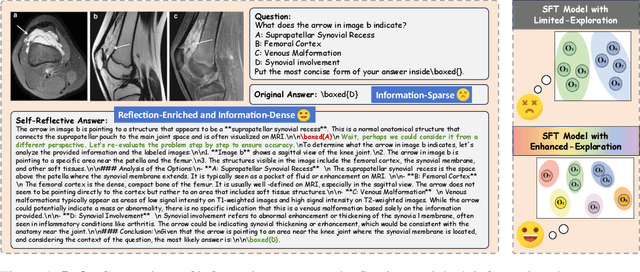
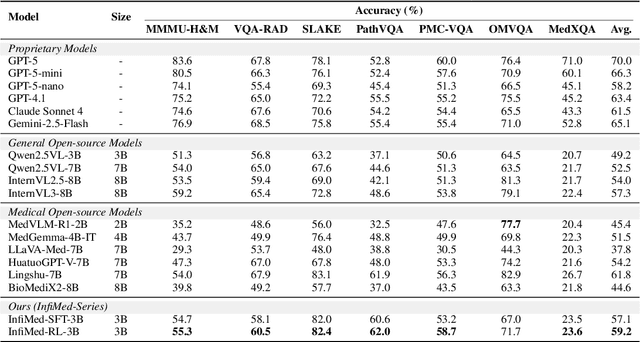


Abstract:Multimodal large language models (MLLMs) have demonstrated promising prospects in healthcare, particularly for addressing complex medical tasks, supporting multidisciplinary treatment (MDT), and enabling personalized precision medicine. However, their practical deployment faces critical challenges in resource efficiency, diagnostic accuracy, clinical considerations, and ethical privacy. To address these limitations, we propose Infi-Med, a comprehensive framework for medical MLLMs that introduces three key innovations: (1) a resource-efficient approach through curating and constructing high-quality supervised fine-tuning (SFT) datasets with minimal sample requirements, with a forward-looking design that extends to both pretraining and posttraining phases; (2) enhanced multimodal reasoning capabilities for cross-modal integration and clinical task understanding; and (3) a systematic evaluation system that assesses model performance across medical modalities and task types. Our experiments demonstrate that Infi-Med achieves state-of-the-art (SOTA) performance in general medical reasoning while maintaining rapid adaptability to clinical scenarios. The framework establishes a solid foundation for deploying MLLMs in real-world healthcare settings by balancing model effectiveness with operational constraints.
InfiR : Crafting Effective Small Language Models and Multimodal Small Language Models in Reasoning
Feb 17, 2025



Abstract:Large Language Models (LLMs) and Multimodal Large Language Models (MLLMs) have made significant advancements in reasoning capabilities. However, they still face challenges such as high computational demands and privacy concerns. This paper focuses on developing efficient Small Language Models (SLMs) and Multimodal Small Language Models (MSLMs) that retain competitive reasoning abilities. We introduce a novel training pipeline that enhances reasoning capabilities and facilitates deployment on edge devices, achieving state-of-the-art performance while minimizing development costs. \InfR~ aims to advance AI systems by improving reasoning, reducing adoption barriers, and addressing privacy concerns through smaller model sizes. Resources are available at https://github. com/Reallm-Labs/InfiR.
InfiFusion: A Unified Framework for Enhanced Cross-Model Reasoning via LLM Fusion
Jan 06, 2025
Abstract:Large Language Models (LLMs) have demonstrated strong performance across various reasoning tasks, yet building a single model that consistently excels across all domains remains challenging. This paper addresses this problem by exploring strategies to integrate multiple domain-specialized models into an efficient pivot model.We propose two fusion strategies to combine the strengths of multiple LLMs: (1) a pairwise, multi-step fusion approach that sequentially distills each source model into the pivot model, followed by a weight merging step to integrate the distilled models into the final model. This method achieves strong performance but requires substantial training effort; and (2) a unified fusion approach that aggregates all source models' outputs simultaneously.To improve the fusion process, we introduce a novel Rate-Skewness Adaptive Fusion (RSAF) technique, which dynamically adjusts top-K ratios during parameter merging for enhanced flexibility and stability.Furthermore, we propose an uncertainty-based weighting method for the unified approach, which dynamically balances the contributions of source models and outperforms other logits/distribution ensemble methods.We achieved accuracy improvements of 9.27%, 8.80%, and 8.89% on the GSM8K, MATH, and HumanEval tasks, respectively.
Unconstrained Model Merging for Enhanced LLM Reasoning
Oct 17, 2024



Abstract:Recent advancements in building domain-specific large language models (LLMs) have shown remarkable success, especially in tasks requiring reasoning abilities like logical inference over complex relationships and multi-step problem solving. However, creating a powerful all-in-one LLM remains challenging due to the need for proprietary data and vast computational resources. As a resource-friendly alternative, we explore the potential of merging multiple expert models into a single LLM. Existing studies on model merging mainly focus on generalist LLMs instead of domain experts, or the LLMs under the same architecture and size. In this work, we propose an unconstrained model merging framework that accommodates both homogeneous and heterogeneous model architectures with a focus on reasoning tasks. A fine-grained layer-wise weight merging strategy is designed for homogeneous models merging, while heterogeneous model merging is built upon the probabilistic distribution knowledge derived from instruction-response fine-tuning data. Across 7 benchmarks and 9 reasoning-optimized LLMs, we reveal key findings that combinatorial reasoning emerges from merging which surpasses simple additive effects. We propose that unconstrained model merging could serve as a foundation for decentralized LLMs, marking a notable progression from the existing centralized LLM framework. This evolution could enhance wider participation and stimulate additional advancement in the field of artificial intelligence, effectively addressing the constraints posed by centralized models.
NeuronBlocks -- Building Your NLP DNN Models Like Playing Lego
Apr 21, 2019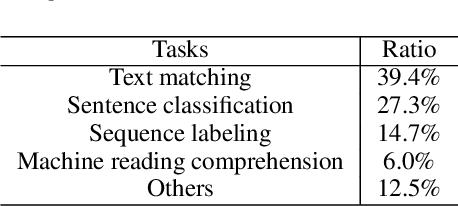
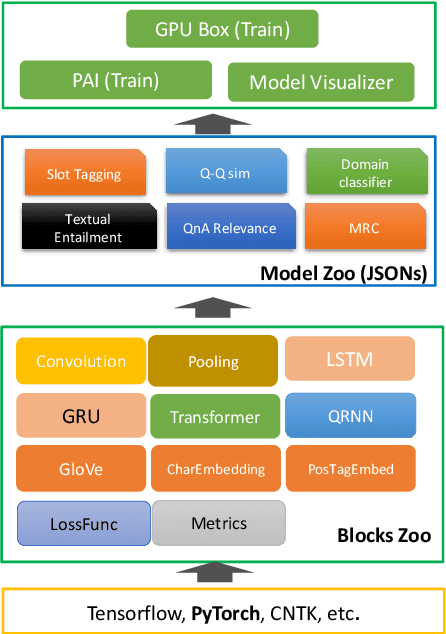
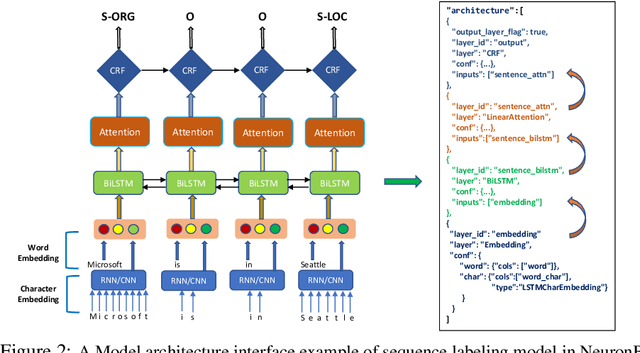

Abstract:When building deep neural network models for natural language processing tasks, engineers often spend a lot of efforts on coding details and debugging, instead of focusing on model architecture design and hyper-parameter tuning. In this paper, we introduce NeuronBlocks, a deep neural network toolkit for natural language processing tasks. In NeuronBlocks, a suite of neural network layers are encapsulated as building blocks, which can easily be used to build complicated deep neural network models by configuring a simple JSON file. NeuronBlocks empowers engineers to build and train various NLP models in seconds even without a single line of code. A series of experiments on real NLP datasets such as GLUE and WikiQA have been conducted, which demonstrates the effectiveness of NeuronBlocks.
 Add to Chrome
Add to Chrome Add to Firefox
Add to Firefox Add to Edge
Add to Edge